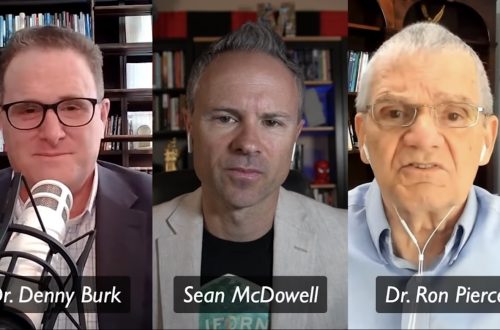Calvin College recently published an article featuring to gay alumni who were the first couple in the county to receive a legal gay marriage. An excerpt:
Both Zach and Colby struggled with their identities while they were students. But they said they came to the conclusion that God does not desire for them to hide part of their identity at the cost of being a Christian.
“It is often times thought of as a dichotomy — that you can’t be gay and Christian at same time.” Colby said. “God takes precedence in both of our lives … and so trying to reconcile homosexuality and engagement in the homosexual community, which seemed to compromise our beliefs in redemption and in God’s salvation, is something that we’ve struggled with our entire lives.”
Colby recounted the moment when he was sitting in the KHvR prayer room, asking God to show him what he should do, and said he felt the Holy Spirit come upon him:
“[It was] a feeling I can’t explain — I can’t explain that intense peace and reassurance and it was only in the Holy Spirit that I felt it. It was just intoxicating and fulfilling and I knew that I was not in the wrong; I was just simply trying to show who I am.”
Zach said that before he allowed himself to identify as a “gay Christian,” he felt like he was only allowing himself to be a Christian with some of his life. He often asked himself which was worse, lying to everyone and yourself, or admitting who you are.
“When I was allowed to be a Christian with all of my life, it just felt better, and still does,” he said.
Read the rest here.




18 Comments
David Brown
Very disappointing. I think it’s important however, to note that this article is from a student-run newspaper, and the college remains opposed to active homosexual relationships.
Ian Shaw
True, but what does it say about the credibility of the newspaper if they are allowing op-eds that boil down to “did God really say…” or “I am who I am”?
Dialogue is one thing, this is something else.
Christiane Smith
how is the following statement different from ‘dialogue’ in your world, IAN?
““Dialogue between communities will always make a difference — if not immediately, then further down the road. Simply talking, discussing and sharing without discrimination or fear or hate. A safe space with pure dialogue and pure listening makes a world of difference.”
Ian Shaw
The school clearly or allegedly has a stance on open homosexual relationships. The op-ed clearly tells the idea that if something “feels” right or “if God told you it’s ok”, than it’s ok to do something that contradicts His word.
Nihilism in society today is sadly swaying people away from truth. Under the guise of “dialogue” people and organizations twist God’s word into something that it’s not.
It’s either wrong to use your feelings to justify sin, or it’s ok. It cannot be both.
Christiane Smith
Hi IAN,
I was asking to find out something about your own experience of ‘dialogue’.
ian Shaw
My own experience with dialogue was been a fallacy. Very few truly hold to the principles or pluralism, because like many things certain groups speak of, it works well on paper only. When starting out in “dialogue” goes well, as soon as you dive into the “why”, people tend to disagree and rather remain respectful, it devolves into ad hominem attacks.
That has been my experience. Dialogue and pluralism are fallacies promoted by many people on the left in the interest of tolerance, but when they’re views are challenged (even in a respectful manner), the other side is “out of touch with reality” or “on the wrong side of history”. Not trying to paint with broad strokes, but that’s been my experience personally.
Christiane Smith
Hi IAN,
sounds like you have had some disappointing experiences . . . I have found out it is a good idea to try to sort out how words are used when people sit down to talk with each other from different ‘worlds’ . . . sometimes a word means one thing to one person and something very different to the other . . . I’ve seen the process of dialogue go well when there was respect AND patience . . . small steps towards understanding are better than no effort at all . . . ‘good will’ helps, too . . . a lot of times the goal is simply to find those issues that both can agree on and also those issues which are points of disagreement that are important and meaningful to both parties in a dialogue . . .
there are people who do not have the ‘temperament’ to sit down with those who are ‘different’ and it is not anyone’s fault if they struggle with attempting a dialogue,
but for those who are patient and respectful, and maybe also ‘hopeful’ of increasing understanding . . . for those people it can be a productive effort
I guess ‘listening’ is the most important gift a person can bring to dialoguing because without it, people just talk past each other, as though they missed what the other had said . . . yes, I would say that the gift of being able to ‘listen’ is much needed among people who seek to understand another person’s ‘world’.
Ian Shaw
Sadly Denny, living in the same state where Calvin is located, I can tell you with near certainty, that many Christian colleges on the west side of the state tend to be very lax with their convictions when it comes to homosexuality.
Cindy Zweber
Cindy Zweber
Good to know as my son half heartedly applied to Calvin. Half heartedly because we are supporters of Answers In Genesis but live in Michigan. This news certainly makes Cedarville appear even more stellar.
Ian Shaw
I have a feeling that Hope is the same way as well. Cedarville is a great college to go to. I went to Spring Arbor for my undergrad, but they had their own share of controversy while I was there 8-10 years ago. I also hear Cornerstone is pretty good on the west side as well.
nancy vossler
what was really sad was reading the comments after the article. . .
Pingback:
Barbara Jackson
It’s interesting to note that this overwhelming feeling that came over him is what he points to as the “Holy Spirit” affirming him in his desires. I think that is worth noting – there is a strong lack of understanding regarding discernment among “spirits”. Similar testimonies have been given by the founders of several cults, even one having claimed an angel visited him with some golden plates. I don’t at all question the validity of the experience, but there needs to be a continued renewal of teaching regarding how one can know what is of the Spirit of God, who He truly is, and what is counterfeit. Lucifer still disguises himself as an angel of light.
ian Shaw
Also need to remind ourselves that God will not contradict His word.
Barbara Jackson
Indeed, which is the main part of learning how to discern the true from the counterfeit; also what He will uphold and exalt and what His purpose is as established by that same Word, through the mouth of Jesus Himself in his final discourse to His disciples as he discussed that. The character of God as revealed by the Word of God, which is itself authored by that same Holy Spirit.
Nathan Cesal
Churches (and Christian colleges) that take the hard line on homosex, homosexuality, gender norms, etc really struggle (if anything at all) to present a viable option for LGBT. At a very basic level, LGBTare misunderstood and aren’t given the opportunity to be honest and authentic. Every relationship is tainted by some misunderstanding and disconnect. These places aren’t a fun place to be and don’t provide a sense of belonging or community for LGBT like they do for people on the typical path toward marriage and family.
Ken Abbott
The call to repentance and brokenness is hard to hear and harder to follow. “Small is the gate and narrow the road that leads to life, and only a few find it.”
ian Shaw
Nathan,
I understand your point, but as far as Christian colleges go, why should they offer a sense of belonging/community for unrepentant sin? It goes for any unrepentant sin regardless of what it is. There’s a process for accountability in the NT.
Christian colleges have statements of faith and openly share what they believe. If you don’t agree with an institution’s worldview, why would you attend? I’m not saying that these places can’t be witnessing opportunities (as I’ve seen people become saved in certain circumstances), but if you know where an institution stands and yet still attend and have qualms about it, do you have a right to complain?
Should Christian colleges be open to the LGBT community? Sure, but there’s a fine line between sharing Christ and loving on people and legitimizing sin.